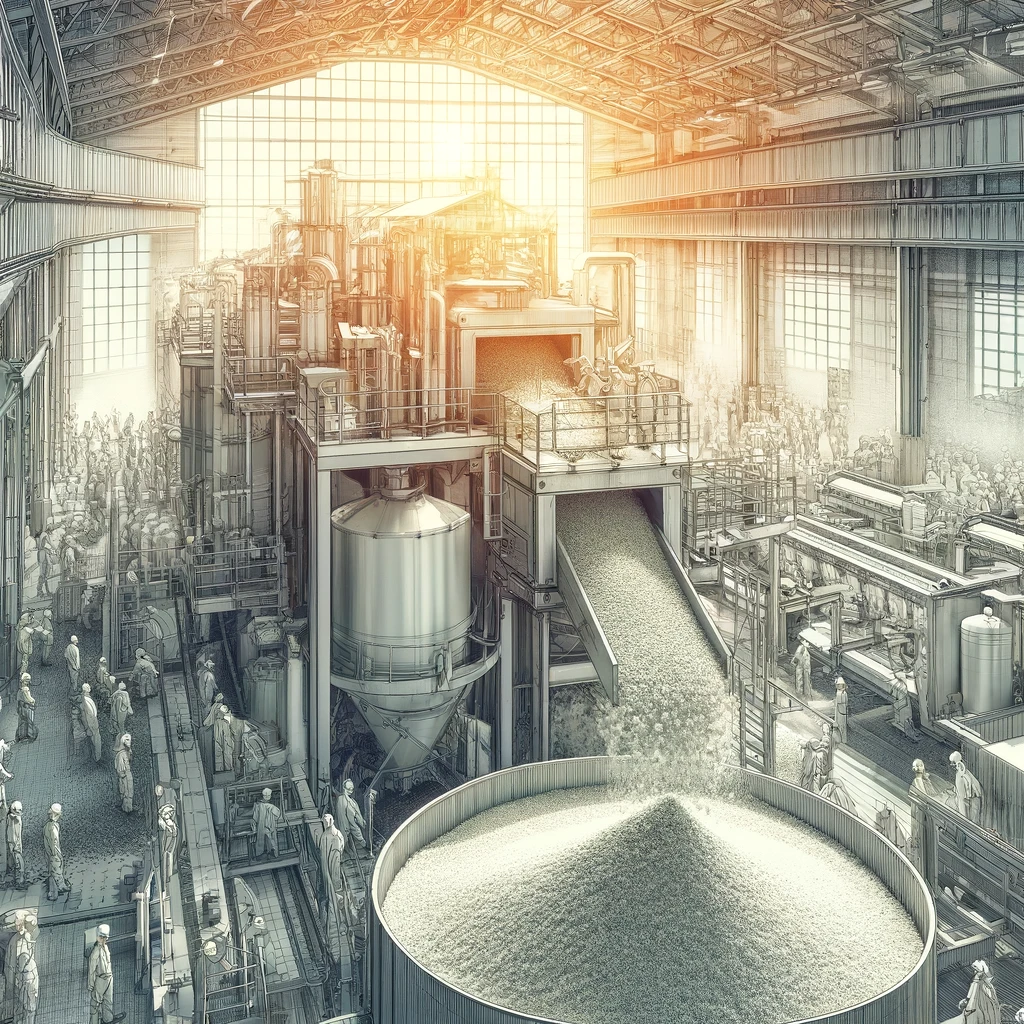Introduction to Water Soluble Organic Fertilizers
The third form of organic fertilizer, water-soluble organic fertilizer, is completely dissolved in water and is immediately absorbed into the plant for rapid plant nutrition unlike the traditional organic fertilizer, which needs to be degraded by soil microorganisms before plants can absorb its nutrients. Water-soluble organic fertilizers apply nutrients directly to the plant by dissolving organic matter fully in water, which is an efficient way to help the plant absorb the nutrients.
There are many advantages to its use. Water-soluble organic fertilizer, according to Helen S Thompson, an agronomist, ‘can be useful in greenhouses and other controlled environments where tight nutrient management is required because nutrients are available immediately for uptake by plants at the time when they need them most, thus enhancing health and yields’.
Furthermore, these fertilizers are well-suited for use in all types of cultivation, from home gardens to large-scale farm fields. They are quick and easy to apply via drip or foliar sprays and can be used in a wide variety of plants under a wide variety of growing conditions.
It supports sustainable agriculture through the reduction of water runoff and leaching of nutrients often associated with synthetic fertilizers and crop mis-management. The targeted application of water-soluble organic fertilizers allows plants to efficiently pick up the nutrient, rather than experiencing typical over-dosages. The result is less waste and reduced negative environmental impact.
Advantages of Using Water Soluble Organic Fertilizers
One of the compulsory advantages of fertilizers based liquids over the solid one is fast-release of nutrients. The granule compositions are spread over soil in a lump, and the state of nutrients is available slowly with the decomposition of chemicals into microorganisms. In contrast to slow dissolving, the compounds based on organic matter are easily dissoluble in water, and as a result, the nutrients release and plants availability become drastic that encourages an uptake of nutrients for rapid plant growth instantaneously.
A third benefit is ease of use. Fertilisation with water-soluble organic fertilizers can be done using various application methods that achieve a more uniform distribution. This can include applying nutrients through a drip irrigation system or a foliar feeding system. Such application methods not only lower labour inputs and wastages, but also ensure that nutrients get more uniformly spread over plants.
Dr James Fielding, the head of soil management at the California-based Beltsville Agricultural Research Centre of the United States Department of Agriculture (USDA), is a proponent of using soluble organic fertilizer based on foliar feeding. He believes foliar feeding ‘side-steps the crop’s root system and delivers fertilizers directly to its foliage, which quickly results in a plant response’.
Furthermore, water-soluble organic fertilizers have a far less negative ecological footprint than traditional fertilizers by saving water and decreasing runoff and nutrient leaching into nearby rivers and other bodies of water. ‘With the targeted application,’ explains the US environmentalist Susan Malley, ‘there is little or no disruption of the native soil biology in an undisturbed soil ecosystem. It does not pollute the water table, and it preserves biodiversity by not using pesticides or herbicides.’
Having these characteristics not only makes water-soluble organic fertilizers an effective plant growth enhancer, it also makes it an ally of green agriculture which advocates environmentally friendly farming. Efficient use of nutrients and reduction of environmental risk make the fertilizers a step ahead in modern agriculture.

Types of Water Soluble Organic Fertilizers
Water soluble organic fertilizers have been on the market for a while. All of them are derived from natural plant, animal or mineral sources, but they are not equal to each other. An understanding of the different types could help gardeners and farmers buy the right type of liquid fertilizer for what the fruit or vegetable might need.
Animalbased fertilizers: These are made from fish emulsion, blood soil meal and bone meal. These fertilizers are very concentrated high nitrogen fertilizers and are very good for leafy plants that require high nitrogen levels. Fish emulsion is not only good for providing quick greenery to the plant but also provides an excellent balanced set of nutrients crucial for providing the right element for a plant to grow vigourously and improves soil health.
Plant-based fertilizers: Seaweed extracts and alfalfa meal are good examples of plant-based water-soluble fertilizers. Seaweed extract is well known in the market for its trace minerals and growth hormones. It will improve plant health and stress tolerance if used properly. Alfalfa meal is very rich in nitrogen and potassium. It stimulates growth and flowering in most plants, and is widely used for ornamentals and vegetables.
Mineral-Based fertilizers: Greensand and rock phosphate, naturally occurring minerals that are ground to a powder for water solubility. Greensand provides potassium, iron, and other trace minerals needed for strong plant growth and disease resistance. Rock phosphate provides phosphorus which is where the energy of foods (as in ATP or adenosine triphosphate) is stored before it is used by the plant.
Each type of water-soluble organic fertilizer is beneficial for growing plants, and each can be chosen due to the difference of soil and plants. Choosing the correct type is helpful to offer plants loenconsure means of nutrition and make them optimal growth during different stages in different surroundings.
How to Choose the Right Water Soluble Organic Fertilizer
Wrong choice of water-soluble organic fertilizer is influenced by plant-soil conditions, therefore understanding plant and soil needs is vital to ensure plant health and yield. Here’s how to go about your choice.
Soil and Plant Needs Assessment: Before fertilising, evaluate the soil and plants to determine nutrient levels and deficiencies. Dr Elaine Foster, a soil health specialist with Texas A&M AgriLife Extension, says, ‘A soil test will indicate what or which nutrients are at deficient, adequate or high levels, which in turn enables you to select a fertilizer that exerts a balancing effect with respect to the current soil fertility status of your soil.’ People who determine that a fertilizer with a specific nutrient balance will benefit their plants may then choose a fertilizer that deficiency-proofs their plants.
Each brand is different from another, and so are the various formulations from one brand to the other. That is why it’s important to read product labels to know the ratio of nutrients and make sure the ratio is suitable for the concerned plants. Reviews and recommendation from amateur and professional gardeners and agricultural experts can be used to filter out brands and formulations that other people know for their quality, and could prove useful in this regard.
DIY vs. Commercial: Some passionate gardeners make their own water-soluble organic fertilizers with compost teas, manure and other homemade potions. These DIY fertilizer options can be economical and allow the maker to tailor nutrition ratios to plants’ needs, but they often lack the dependable and consistent nutrient ratios of commercial products. Although easy and often reliable, commercial fertilizers can be expensive. When there is a large operation, or when the gardener wants to guarantee a controlled spread of nutrients, there is little choice but to go with the consistency of synthetic fertilizers.
Better understanding of these parameters can really help the gardener or the farmer to choose a suitable water-soluble organic fertilizer that ensures the well-maintained plant growth and sustainable fish farming ecosystem.

Application Tips for Maximum Effectiveness
It is important for gardeners and farmers who want to exhaust all the benefits of water-soluble organic fertilizer, to know how to mix and use it most effectively. This is how to do it:
Best Practices When Mixing and Applying: When preparing water-based or water-soluble organic fertilizers, it is important to follow the batch instructions of the manufacturer to avoid over- and under-concentration of nutrients and dealing with dead and/or damaged plants. Dr Karen Mitchell, a plant physiologist, says – ‘Use clean mixers gear when mixing fertilizer, to avoid contamination inside the formulation.’ She adds, ‘All active nutrients should be mixed properly to enable the complete availabiltiy of the fertilizer for plants.’
Frequency and Time of Application Of fertilizers across the entire lifecycle of plants, especially when they are water-soluble and organic, should be done early in the morning or late in the evening to reduce nutrient losses to evaporation and improve absorption. The frequency of application depends on the development phase and nutritional needs of the plant. Young plants will require to be fertilised every week, as against the older ones who might not need frequent fertilizer application.
Safety Precautions: While using fertilizers, even organic ones, do not forget to stay safe. Use a pair of gloves and some protective eyewear while applying fertilizers. It will help you avoid skin irritation and eye injuries. The fertilizers should be stored away from children and pets, in a cool, dry place to avoid any accidental ingestion.
Following these application tips, water-soluble organic fertilizer will enable you to cultivate crops of the finest health and most abundance.
Conclusion
Using water-soluble organic fertilizers can bring multiple advantages that can enhance plant growth and especially make gardening and farming more efficient and environment-friendly. It has features of fast-activeness and better availability of nutrients as well as ease of application. Ultimately, it will become gardeners’ (both amateur and professional) first choice.
In particular, as the agricultural sector advances towards further sustainability, water-soluble organic fertilizers have a central role to play in the efficient and environmentally friendly supply of plant nutrients. This approach represents a pragmatic approach that is compatible with the objectives of modern agricultural production such as ecological balance and resource-efficient deployment.
Likewise, gardener and farmers are encouraged to begin fertilising with water-soluble organic fertilizers. They will enjoy healthier plants, and will help agriculture transition to a more sustainable future. Courtesy of the Utah State University Extension Water-soluble fertilizers will improve yield, the health of our soil, and our overall environment.
Here are three scholarly references related to water-soluble organic fertilizers :
- Quantifying the Impact of Organic Fertilizers on Plant Growth: This study utilizes a bio-organic fertilizer that is soluble in water, comprising organic substances and specific nutrients beneficial for plant growth. The detailed analysis of nutrient content and the impact on plant health are discussed extensively.
- Liquid Organic Fertilizer Production for Growing Vegetables Under Controlled Conditions: This article presents research on the chemical properties of different organic substrates used in liquid organic fertilizer production, highlighting their effectiveness in vegetable cultivation.
- Coupling Effect of Water and Soluble Organic Fertilizer on Yield and Soil Properties: This study investigates the effects of an integrated water and fertilizer system on crop yield and soil properties, providing insights into the benefits of using water-soluble organic fertilizers in agriculture.







